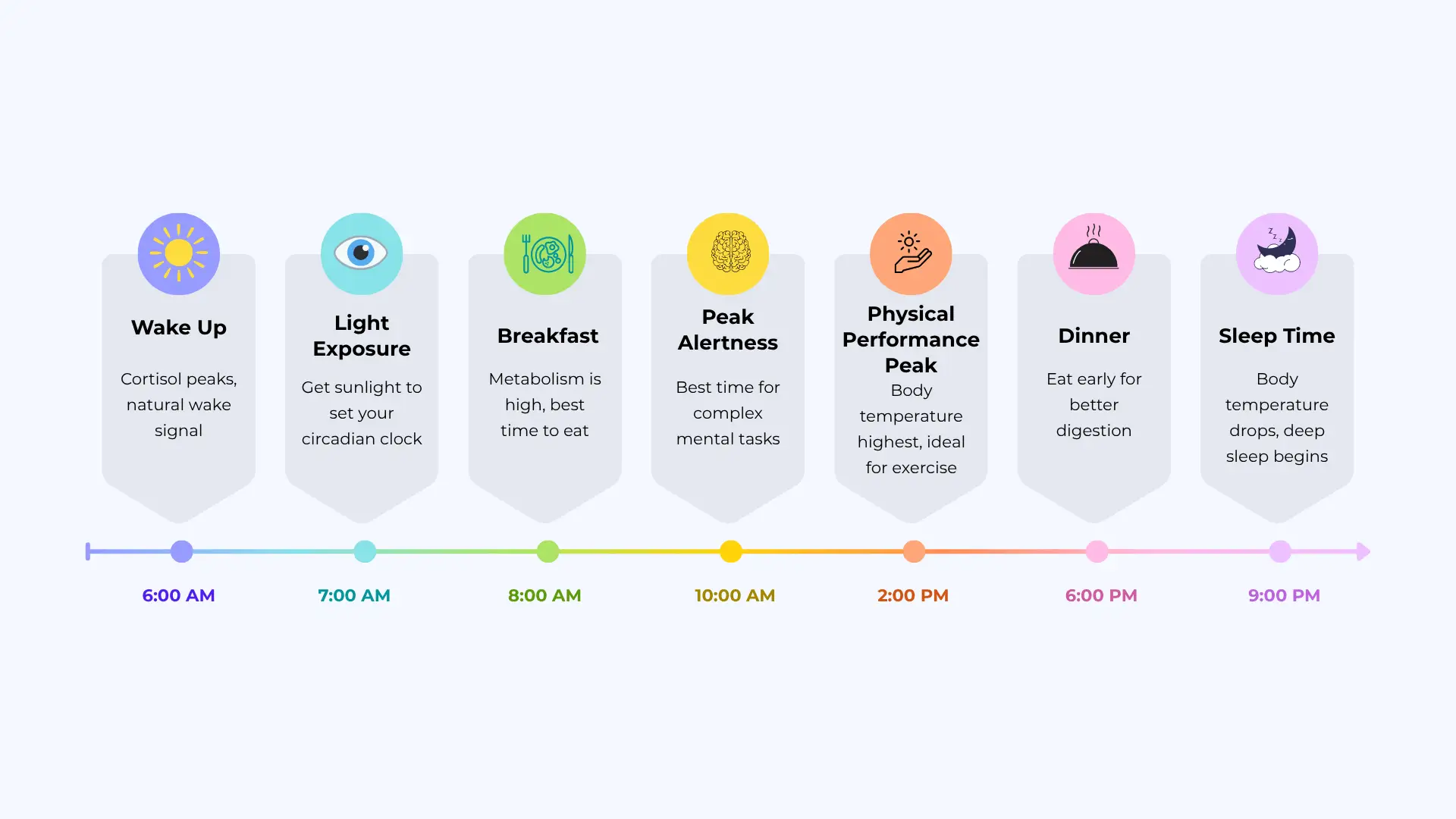Have you ever experienced the feeling of being out of rhythm when your body clock operates differently than your brain? You are not alone. Millions of individuals fight daily to balance their native body cycles while facing exhaustion and stress alongside feelings of anxiety. By mastering your circadian rhythms, one can achieve better mental health along with more energy and enhanced mental clarity.
Your body runs an internal clock called circadian rhythms, which control both your sleep patterns and your emotions. The approximately 24-hour biological processes function as essential regulators of our energy patterns, as well as our mental concentration and total health and wellness. Someone can recover lost control over their mental health when circadian rhythms become disturbed. The following article discusses laboratory-verified strategies to align your circadian rhythms, which ultimately boost your mental health.
Understanding Circadian Rhythms
What Are Circadian Rhythms?
The body operates with internal biological periodic patterns called circadian rhythms, which run on approximately 24-hour cycles. Biological functions such as sleep-wake patterns, together with hormone levels, eating behavior, and body temperature, fall under circadian rhythm regulation. Through an internal timing system, your body establishes its precise moments for being alert followed by resting periods.
Your sleep-wake pattern represents the most recognizable circadian rhythm. Nighttime, your body’s natural circadian rhythm system creates sleep preparation that brings drowsiness together with morning wakefulness because of these rhythms. The reproductive cycle depends mainly on external light conditions. Sunshine, especially in the morning, helps your brain lower melatonin levels, the hormone that regulates sleep. Your body makes more melatonin as evening comes and you’ve been awake all day. This hormone is helpful to you in relaxing and falling asleep. This is the perfect time to rest.
If you compare your body to a machine, your circadian rhythm is similar to a gear solution that maintains optimal operation. At rhythmic alignment, all aspects of your life, including sleep quality along with mood, improve substantially.
Why Do They Matter for Mental Health?
Your circadian rhythms control both sleep patterns and mental health functions. Disruptions to your inner biological clock make you more likely to develop mental health difficulties alongside anxiety, depression, and cognitive decline. Scientific studies demonstrate that disruptions to your natural body rhythm cause unstable emotions and mental fatigue.
Lenoir work schedules, which involve night shifts and irregular shift hours, lead shift workers to experience repeated disturbances of their circadian timing system. Higher stress levels together with mental health disorder risks become more common when your schedule suffers from disturbances. The Psychiatry Research study reveals that persons enduring ongoing desynchronization of their circadian rhythms tend to face higher risks of depression and anxiety disorders.
Circadian rhythms serve two major functions beyond sleep regulation by controlling hormone production, particularly affecting the stress hormone cortisol. When your hormones are out of balance, it sets off a series of negative effects that directly impact your mental fitness. Here is the detailed infographic below to optimize your daily routine by aligning with your body’s natural 24-hour cycle.

The Science Behind Circadian Rhythms and Mental Health
The hypothalamus takes center stage as the controller for fundamental body processes, while serving as the central component of circadian rhythms. Signals from your eyes pass to the hypothalamus, allowing it to control your circadian rhythm through light and dark detection. Your brain produces melatonin through darkness signals to help you sleep.
The human body uses light, including blue light from screens, as its main agency to perform this process. Your circadian rhythm gets reset through morning sun exposure, yet nighttime contact with blue light disrupts your sleep signals, creating nighttime sleeplessness. People should minimize their screen time during nighttime hours, combined with daily morning exposure to outdoor sunlight.
Impact on Mental Health
Irregularities in circadian rhythms result in serious possibilities for mental health conditions. Throughout scientific literature, poor sleep quality due to irregular circadian rhythms shows strong associations with mood disorders, but specific new data expands the understanding of its impact. Your brain produces less serotonin, the “feel-good” hormone, while releasing more cortisol, the stress hormone, through lack of sleep. The combination results in feelings of irritability together with anxiety alongside depressive symptoms.
Accompanied evidence comes from Seasonal Affective Disorder. The seasonal depression called SAD occurs when circadian rhythms endure disruptions because people receive less sunlight during winter months. Sunlight deprivation leads people with SAD to develop abnormal sleep routines along with poor energy levels while struggling to focus.
When your body syncs its circadian rhythms, it produces improved mental health along with better cognitive abilities. The University of Colorado completed a study showing that people who kept regular sleep-wake patterns gained increased energy levels along with improved focus across their daily activities.
Comparison of Mental Health Outcomes
| Circadian Rhythm | Mental Health Impact |
|---|---|
| Regular rhythms | Better sleep quality, stable mood, higher energy, improved focus |
| Disrupted rhythms | Increased risk of depression, anxiety, fatigue, irritability |
The data demonstrates that healthy circadian alignment produces favorable mental health results, yet circadian rhythm disturbances raise significant mood disorder risks.
Signs Your Circadian Rhythm Is Out of Sync
Through an unseen process, your circadian rhythm maintains control over your energy level and emotional state. Any misalignment in your circadian rhythm will disrupt the balance of your entire system. Several variations exist in the signs of a misaligned circadian rhythm, but physical symptoms, emotional changes and behavioral patterns often manifest as indicators.
Physical Symptoms

Your body reveals signals through physical symptoms when your circadian rhythm becomes disrupted. These might include:
- Chronic fatigue: Hours of daytime fatigue could point to an improper match between your sleep-scheduling patterns and your internal body clock rates. Your nonstop tiredness results in decreased work efficiency while DBAT 2 makes all regular tasks seem excessively difficult.
- Headaches: Missed coordination between your scheduled sleep time and your natural sleep/wake cycle leads to developing tension headaches. Peculiar headaches develop more commonly as circadian rhythms become misaligned while sleep problems remain active.
- Weight fluctuations: Your metabolic processes and appetite control systems become impacted when your body’s daily timetable becomes off-center. Daytime hunger strikes can occur without warning with increased hunger for carbohydrates as well as sugar, and you might observe weight fluctuations because of disturbed eating habits.
Emotional Signs
Your body’s natural rhythms influence physiological state as well as emotional responses. When your body’s natural cycle is disrupted, it can lead to:
- Irritability: Your sleep cycle disturbances result in becoming irritable and swinging through different emotional states. Due to impaired emotional processing your brain undergoes because it did not receive proper rest, you can become more quickly frustrated and annoyed.
- Difficulty focusing: Your ability to concentrate becomes impaired when either fatigue or your biological rhythm fails to recognize proper alert times. A disrupted sleep pattern reduces workplace effectiveness as well as schoolwork achievement and the ability to finish assigned tasks.
- Low motivation: Your circadian rhythms that fail to match properly will create a lack of motivation. Your body seems unable to generate the necessary energy levels you require, leading to dropped alertness and decreased interest in both work commitments and leisure activities.
Behavioral Indicators
The way you behave can also offer clues that your circadian rhythms are off:
- Irregular sleep patterns: Cells that repeatedly go to sleep without a pattern at various daily times signal improper alignment between your nighttime circulation system. People who perform shift work or maintain irregular working hours often display this condition.
- Reliance on caffeine: People commonly drink caffeine to fight fatigue that results from their disrupted body rhythms. Knowing when your body needs additional coffee or energy drinks to stay awake reveals that your body operations differ from their biological continuous pattern.
- Late-night alertness: Late night alertness that continues despite an upcoming busy schedule could indicate problems with your circadian clock. Late-night people called “night owls” often develop misalignment because of their late evening activities and struggle with early morning wakeups.
Early identification of these signs lets you take preventative measures to correct your circadian rhythm before health complications emerge mentally and physically.
How to Improve Your Body’s Daily Rhythm
After you understand the signs your circadian rhythm needs adjustment, we can examine specific measures to restore balance. Learning to manage your circadian rhythms leads to better mental health together with increased productivity and better overall well-being. These steps will help you reset your circadian rhythm.
Make Your Sleep Area Comfortable
Your environment at bedtime strongly influences when your circadian rhythm resets. Turning your bedroom into a restful environment leads to better deep rest for your body.
- Block out light: Your brain receives signals from light that could confuse it into thinking it remains daytime. The dark rest you need at night requires using blackout curtains combined with an eye mask to create the necessary level of darkness in your room.
- Create a consistent sleep schedule: Stick to a regular schedule both at bedtime and wake-up time throughout the entire week. A regular sleep schedule aids your body by strengthening its ability to follow its natural rhythms, which produces better sleep quality and natural waking times.
- Establish a bedtime routine: The implementation of peaceful nighttime habits promotes brain signals that tell your body to relax. Your bedtime activities should include book reading as well as warm baths and gentle stretching routines. You risk losing your ability to sleep restfully when you stay active through beginner bedtimes by watching tense television or operating electronics.
Use Natural Light
Your body depends heavily on light exposure to maintain healthy circadian rhythm regulation. You will learn to easily and effectively make the most of it.
- Morning sunlight exposure: Devote yourself to receiving 10-15 minutes of daily morning sunlight. Sunlight exposure during the morning tells your brain to be alert and promotes clear-minded behavior for the entire day.
- Avoid blue light in the evening: The emission of blue light on electronic devices, including phones and computers, blocks melatonin production, which interferes with your ability to fall asleep. You should stay away from digital devices starting one hour before your bedtime, but blue light filters on these screens help reduce their impact on nocturnal rest.
- Take breaks to step outside: You should form a regular habit of spending short outdoor sessions during daylight hours when you remain mostly indoors throughout the day. Natural outdoor light exposure can help your circadian rhythm function better while also improving mood.
Eat Meals at the Same Time
Your eating schedule throughout the day creates just as much impact on your health as your dietary choices do. Your energy levels and lack of tiredness will improve when you schedule your food consumption to line up with your body’s natural rhythm.
- Eat breakfast early: Getting a nutritious breakfast early after rising up activates your metabolic activity and provides essential energy during the first hours of your day.
- Avoid late-night meals: Eating a major meal after dark interferes with your nighttime sleep patterns. Your digestion needs at least 2-3 hours following your evening meal to complete before you start your bedtime routines.
- Circadian-friendly meal plan: Organize your meals by eating nutritionally balanced foods at times that match your daily energy levels. Your body functions best when you start your day with a high-fiber protein breakfast and then consume lighter meals through the afternoon leading to moderate food portions at dinner.
Get Regular Exercise
Besides physical advantages, exercise delivers direct benefits to how your body regulates proper sleep patterns.
- Morning workouts: The first thing in the day works best for exercising when possible. The early performance of physical exercise strengthens both your energy production and alertness, which allows your biological rhythms to stay balanced.
- Calming evening stretches: Yoga, along with stretching, serves as an appropriate nighttime exercise alternative since it is gentler. Choose calming evening stretches because they release tension in your muscles so your body can better prepare for restful sleep.
- Exercise for sleep quality: Scientific research reveals that routines of physical exercise create improvements in the quality of nightly rest. Physical workouts allow your body to control your natural sleep-wake schedule so you can sleep better at night and wake at appropriate times.
Control Stress and Take Time to Relax
Your mood-regulating circadian rhythm faces disruption when you experience stress. Successful stress management practices allow your body to maintain its natural rhythm, thus protecting mental well-being.
- Practice mindfulness or meditation: Deep breathing or guided meditation practiced during the evening helps compose your nervous system and makes it easier to sleep.
- Create a relaxation routine: Establish nightly activities that mark relaxation downtime by taking a warm bath, reading a peaceful book, or enjoying peaceful music.
- Guided meditation: A basic breathing meditation will work best when you want to fall asleep. Find a quiet room to sit in, then fill your lungs with five deep breaths before relaxing all tenseness in your body.
Consistent small actions lead to better mental health outcomes alongside better sleep and greater well-being by helping you recover control of your circadian rhythm.
The Effects of Not Getting Enough Sleep on Your Body Clock
Sleep deprivation stands as the key factor that disrupts your circadian rhythm most extensively. Sleep deprivation creates effects that impact every aspect of your health while influencing your physical and mental dimensions simultaneously.
A. Hormonal Change
The hormone imbalance caused by inadequate rest stands as the main circadian rhythm disruptor from sleep deprivation. Lack of rest causes your body to make elevated levels of cortisol stress hormone while lowering your melatonin level that supports sleep. Sleep-related hormone imbalances distort your body’s ability to understand alert times versus rest times, which leads to internal clock misalignment.
Your body produces cortisol as a response to stress, yet this hormonal substance keeps you awake and alert during daytime hours. Such mismatches between your internal body clock result in unexpected cortisol spikes during nighttime, creating extra difficulty in falling asleep. People who lack sleep tell others they feel wide awake even though they recognize it’s time for bed.
B. Poor Mental and Physical Performance
Many scientists have documented how sleep deprivation affects mental performance levels. Inadequate sleep impairs multiple cognitive abilities, which include your powers of decision-making, memory retention, and focus. The inadequate rest intensifies emotional responses that most of us experience when we wake up from troubled sleep.
The body encounters two major health consequences from not getting enough rest at night. When your body lacks sufficient rest, it struggles to repair itself and completes muscle development more slowly. Your capability to process food optimally decreases during sleep deprivation, leading to weight problems.
C. Higher Risk of Long-Term Health Problems
The human body develops different long-lasting medical conditions when sleep deprivation occurs because it disrupts the natural circadian rhythm. Medical studies associate daily irregular sleeping and clinical conditions that include heart disease as well as diabetes and obesity and cancer types. The human body needs sleep through which restraint and regeneration processes enable cellular repair. Not receiving enough rest at night makes your entire body work below peak capacity, thus leaving you open to disease risks.
Scientific research indicates that when individuals repeatedly experience sleep shortage, they develop increased susceptibility to metabolic health disorders, including Type 2 diabetes. Sleep maintains insulin sensitivity, and when sleep is insufficient, the body loses its capability to handle glucose, which produces sudden blood sugar spikes.
Daily sleep shortages eventually lead to lowered immune system function, so your body struggles to fight against sickness and diseases.
D. Sleep Loss and Mood Issues

Sleep deprivation practices have already been identified as risk factors that cause both anxiety and depression. An off-kilter circadian rhythm disrupts the brain’s ability to control neurotransmitters like serotonin and dopamine, which under normal conditions regulate mood. Insufficient sleep creates irritability while decreasing resilience and possibly developing severe mental health problems when sleep deficit continues.
How Food Affects Your Body Clock
The specific foods we consume create dual effects on our bodily structure together with our body clock rhythms that monitor brain functions. Human body clocks show great sensitivity to eating times because they either build or break down natural rest-wake patterns. Particular food items might support the circadian rhythm when eaten appropriately but could easily disrupt this internal body cycle.
Foods with Melatonin
Humans body naturally produce the essential hormone melatonin which controls their sleep and wake schedules. The brain receives signals from melatonin which trigger the mechanism to fall asleep. Your body makes more melatonin when you consume foods that contain this hormone. Pay attention to your dietary melatonin intake because it helps support healthy sleep-wake cycles together with preserving your circadian rhythm balance.
The sleep hormone melatonin naturally occurs at elevated levels in both cherries and grapes and tomatoes and nuts, with almonds being particularly rich sources. Eating melatonin-rich foods during evening snacks and meals helps your body signal bedtime. The serotonin-producing amino acid tryptophan found in turkey, along with eggs, creates melatonin through its conversion pathways, helping sleep preparation.
Conclusion
When your body clock reaches synchronization, it delivers better sleep functions while also enhancing mental well-being and physiological health. Simple changes, such as early morning sunlight exposure together with routine sleep schedules and proper stress management techniques, will significantly affect your health.
Both these easy-to-implement suggestions work for any person who wants to improve their mental health. The improvement operations on your body clock call for sustained commitment, but each little action you make brings you closer to greater happiness and strength. So, why not start today? Practicing these methods will allow your mind and body to create maximum impact toward achieving your potential.
Call to Action: Which tip will you use first? Please post your reactions and recommendations in the discussion segment while protecting this article for future reference and monitoring your progress. Through body clock congruence we can reach superior mental well-being.
Recommended Resources to Support Better Sleep and Mental Health
Here’s a collection of science-backed tools and gadgets designed to help you keep your circadian rhythm balanced and healthy. These are affiliate links, when you make a purchase through them, you support Learning Breeze at no extra cost to you.
- BluBlox Sleep+ Blue Light Blocking Glasses
- YnM Weighted Blanket
- OLLY Sleep Gummies with Melatonin, L-Theanine & Botanicals
- Fitbit Inspire 3 Health & Fitness Tracker
FAQs About Circadian Rhythms and Mental Health
It usually takes 1 to 2 weeks of consistent sleep and wake times, exposure to natural morning light, and healthy routines to reset your circadian rhythm. However, if your schedule keeps shifting, it can take longer to stabilize.
Yes. Studies show that irregular sleep patterns disrupt hormones like melatonin and cortisol, which affect mood and stress levels. Over time, this imbalance can increase the risk of anxiety and depression.
Common signs include difficulty falling asleep, waking up tired, mood swings, late-night alertness, and brain fog during the day. If you consistently feel “out of sync,” your biological clock may need resetting.
Wake up at the same time every day, get sunlight within 30 minutes of waking, limit caffeine after 2 PM, avoid screens before bed, and make your bedroom dark and cool. Also, exercise earlier in the day rather than late at night.
Short naps (20–30 minutes) can boost focus and energy without harming your rhythm. But long or late-day naps can delay nighttime sleep and disrupt your natural cycle.
Melatonin supplements can help temporarily, especially during travel or shift changes. However, they should not replace consistent sleep habits. Always consult a doctor before long-term use.
References
- American Psychological Association. (2023). Circadian Rhythms and Mental Health. Retrieved from https://www.apa.org
- Harvard Health Publishing. (2022). Resetting your circadian rhythm for better mental well-being. Retrieved from https://www.health.harvard.edu
- National Institute of General Medical Sciences (NIGMS). (2023). Circadian Rhythms Fact Sheet. Retrieved from https://www.nigms.nih.gov
- Foster, R. G., & Kreitzman, L. (2014). Circadian Rhythms: A Very Short Introduction. Oxford University Press.
- Walker, M. (2017). Why We Sleep: Unlocking the Power of Sleep and Dreams. Scribner.
- McClung, C. A. (2013). How might circadian rhythms control mood? Let me count the ways… Biological Psychiatry, 74(4), 242–249. https://doi.org/10.1016/j.biopsych.2013.02.019
- Turek, F. W., & Zee, P. C. (2015). Circadian rhythms and the sleep-wake cycle. In Principles and Practice of Sleep Medicine (6th ed.). Elsevier.
- Czeisler, C. A., & Gooley, J. J. (2007). Sleep and circadian rhythms in humans. Cold Spring Harbor Symposia on Quantitative Biology, 72, 579–597. https://doi.org/10.1101/sqb.2007.72.064
- World Health Organization. (2023). Mental health and sleep: a growing public health concern. Retrieved from https://www.who.int




